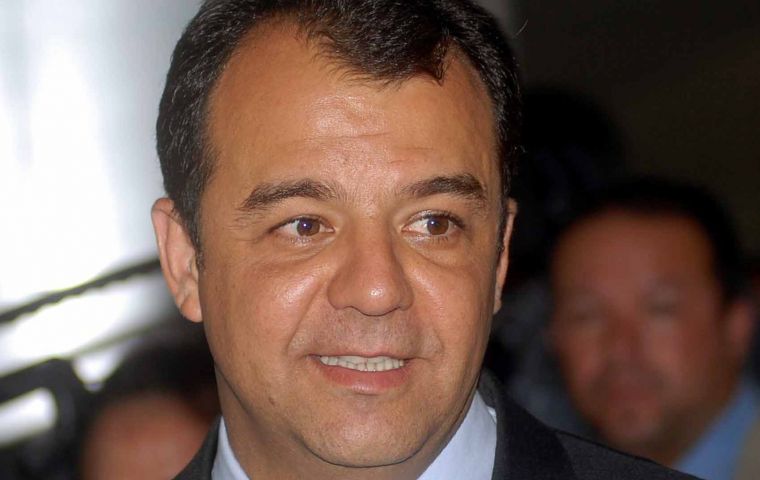MercoPress. South Atlantic News Agency
World Bank loan to improve quality of life in Rio do Janeiro’s favelas
 Sérgio Cabral, Governor of Rio de Janeiro is sponsoring the program Morar Seguro (Safe Homes)
Sérgio Cabral, Governor of Rio de Janeiro is sponsoring the program Morar Seguro (Safe Homes) Some two million people who live in informal low income settlements (favelas) in the Rio de Janeiro Metropolitan Region, Brazil, will be benefiting from a 485 million US dollars development policy loan for the Metropolitan and Housing Project approved by the World Bank.
Local population will benefit from policies that will improve social service delivery through innovative programs that expand urban and social services such as health and education to the favelas.
The loan will improve the State’s capacity regularize land tenure, map risk areas, formalize ownership of homes where possible and provide incentives for investment or resettlement where needed.
The new financing follows the record January flooding that killed over 800 in the State of Rio de Janeiro and will help to better manage disaster risks and improve planning and territorial growth management in the Rio Metro Region, which houses almost 12 million people.
“This loan, that does not require counterpart funds, is fundamental for the numerous urban initiatives currently underway in Rio, such as the Morar Seguro Program, that aim to improve housing quality, safety and availability, as well as public transportation to our entire population,” said Sérgio Cabral, Governor of the State of Rio de Janeiro
“With the partnership of the World Bank and the Federal Government, we are further expanding social services into the pacified favelas, creating safe and affordable alternatives for people in risk areas, extending integrated inter-municipal single fare transport and coordinating work across the state and municipalities”.
The government’s policies supported by the loan will reduce settlement pressures on risk areas, decreasing the likelihood of disasters. In the last four years, climatic events displaced more than 100,000 families in the state, and contributed to the lack of adequate housing, especially for the poor. Disaster risks have yet to be clearly identified and mapped in many areas of the Metro Region, and environmental degradation, irregular urban occupation, and disaster risk affect poor residents most heavily.
“This loan responds to requests by President Dilma Rousseff and Governor Cabral,” said Makhtar Diop, World Bank Director for Brazil. “The President asked that the Bank deepen its support to Brazil on urban issues, with an especial focus on managing disaster risks. Several other projects in Brazil are already being negotiated or restructured with this purpose.”
He added that the World Bank’s new partnership strategy with Brazil will have natural disaster mitigation and preparedness as one of its central themes.
The Rio loan will be disbursed in two-tranches. The first, of 290 million US dollars, once the loan is signed and goes into effect. The second, of 195 million USD, after the government completes an additional agreed set of actions, including strengthening urban governance mechanisms in several areas and improving the capacity to deliver key social services.
The city of Rio do Janeiro will be hosting the World Cup in 2014 and the Olympics in 2016.




Top Comments
Disclaimer & comment rules-

Read all commentsI saw this and though “Just like the Argentinian recent World Bank loan . . .
Mar 17th, 2011 - 04:46 pm 0. . . but NO, a different programme, The Metropolitan and Housing Project, with different aims.
“The loan will improve the State’s capacity regularize land tenure, map risk areas, formalize ownership of homes where possible and provide incentives for investment or resettlement where needed.” . . . . . . All of which should have been done by previous Brasilian governments, but which turned blind eyes and let the favelas happen.
I like the conditions attached – like it needs strengthened urban governance, like it will happen only in PACIFIED favelas, like it will remove settlements from (flood/landslide) risk areas.
One can only hope that the funding will support sewerage/sewage treatment and pollution control.
GOOD FOR DILMA !
GOOD FOR CABRAL !
I look forward to a ‘crash programme’ of works, a new approach to supporting the poor in Rio society, a corrupt-less management and use of both tranches of loan, and a timely repayment of the loan debt.
Today Rio, tomorrow SP . . . . and Salvador (we are waiting Mr Wagner).
Commenting for this story is now closed.
If you have a Facebook account, become a fan and comment on our Facebook Page!